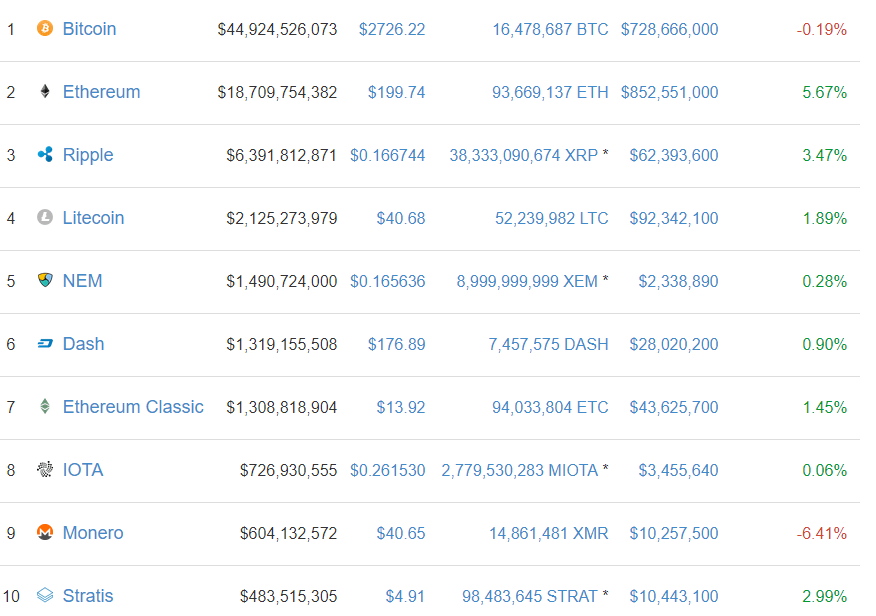
IMF Head – Cryptocurrency Could Be the Future. Really.
Christine Lagarde sees a path ahead for cryptocurrency.
The managing director of the International Monetary Fund, or IMF, talked up the potential of virtual currencies to supplant traditional monies in coming decades on Friday. Cryptocurrencies, or virtual currencies, are a new class of digital assets powered by blockchains, distributed ledgers that made their name underpinning networks like Bitcoin and Ethereum.
Unlike JPMorgan Chase CEO Jamie Dimon and billionaire hedge fund founder Ray Dalio, who have recently disparaged Bitcoin, the world's most well known cryptocurrency, Lagarde shared a rosier vision of the general technology's future with attendees of a Bank of England conference in London. "In many ways, virtual currencies might just give existing currencies and monetary policy a run for their money," she said.
"It may not be wise to dismiss virtual currencies," Lagarde told the audience. "Instead, citizens may one day prefer virtual currencies."
Lagarde devoted a third of her talk, which envisioned how financial tech may reshape the world by the year 2040, to the subject of cryptocurrency. She noted that digital money could gain popularity as engineers work through technology issues related to processing more payments through blockchain networks in the future.
"Why might citizens hold virtual currencies rather than physical dollars, euros, or sterling? Because it may one day be easier and safer than obtaining paper bills, especially in remote regions," Lagarde said. "Virtual currencies could actually become more stable."
Lagarde couched her predictions with the pretense of sci-fi ("Are you ready to jump on my [hovering drone] pod and explore the future together?" she said), but her forecast matches the view of other big-name optimists, like Fidelity CEO Abigail Johnson. "I'm a believer," Johnson said at an industry conference earlier this year about digital currencies.
Other topics Lagarde touched on included the possible disruption of the traditional banking business model by fintech upstarts as well as the advent of artificial intelligence.
You can read Lagarde's prepared remarks in full here, or read on for the segment about cryptocurrency, below.
1. Virtual currencies
Let us start with virtual currencies. To be clear, this is not about digital payments in existing currencies—through Paypal and other “e-money” providers such as Alipay in China, or M-Pesa in Kenya.
Virtual currencies are in a different category, because they provide their own unit of account and payment systems. These systems allow for peer-to-peer transactions without central clearinghouses, without central banks.
For now, virtual currencies such as Bitcoin pose little or no challenge to the existing order of fiat currencies and central banks. Why? Because they are too volatile, too risky, too energy intensive, and because the underlying technologies are not yet scalable. Many are too opaque for regulators; and some have been hacked.
But many of these are technological challenges that could be addressed over time. Not so long ago, some experts argued that personal computers would never be adopted, and that tablets would only be used as expensive coffee trays. So I think it may not be wise to dismiss virtual currencies.
Better value for money?
For instance, think of countries with weak institutions and unstable national currencies. Instead of adopting the currency of another country—such as the U.S. dollar—some of these economies might see a growing use of virtual currencies. Call it dollarization 2.0.
IMF experience shows that there is a tipping point beyond which coordination around a new currency is exponential. In the Seychelles, for example, dollarization jumped from 20 percent in 2006 to 60 percent in 2008.
And yet, why might citizens hold virtual currencies rather than physical dollars, euros, or sterling? Because it may one day be easier and safer than obtaining paper bills, especially in remote regions. And because virtual currencies could actually become more stable.
For instance, they could be issued one-for-one for dollars, or a stable basket of currencies. Issuance could be fully transparent, governed by a credible, pre-defined rule, an algorithm that can be monitored…or even a “smart rule” that might reflect changing macroeconomic circumstances.
So in many ways, virtual currencies might just give existing currencies and monetary policy a run for their money. The best response by central bankers is to continue running effective monetary policy, while being open to fresh ideas and new demands, as economies evolve.
Better payment services?
For example, consider the growing demand for new payment services in countries where the shared, decentralized service economy is taking off.
This is an economy rooted in peer-to-peer transactions, in frequent, small-value payments, often across borders.
Four dollars for gardening tips from a lady in New Zealand, three euros for an expert translation of a Japanese poem, and 80 pence for a virtual rendering of historic Fleet Street: these payments can be made with credit cards and other forms of e-money. But the charges are relatively high for small-value transactions, especially across borders.
Instead, citizens may one day prefer virtual currencies, since they potentially offer the same cost and convenience as cash—no settlement risks, no clearing delays, no central registration, no intermediary to check accounts and identities. If privately issued virtual currencies remain risky and unstable, citizens may even call on central banks to provide digital forms of legal tender.
So, when the new service economy comes knocking on the Bank of England’s door, will you welcome it inside? Offer it tea—and financial liquidity?
Author: Robert Hackett
Posted by David Ogden Entrpreneur

David https://markethive.com/david-ogden









